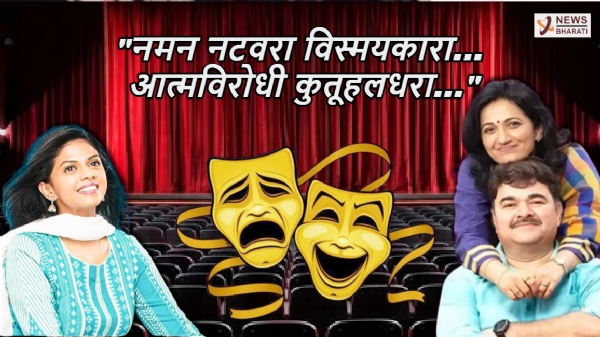Marathi Rangabhoomi Divas: Celebrating the Glorious Heritage of Marathi Theatre
The journey of Marathi theatre started in the year 1843 with Vishnudas Bhave’s Sita Swayamvar and thus began the era of Marathi Theatre
Total Views |
"नमन नटवरा विस्मयकारा...
आत्मविरोधी कुतूहलधरा..."
Marathi theatre, an exquisite gem within the treasure trove of Indian performing arts, has consistently dazzled audiences with its vibrant fusion of culture, drama, and the spirit of Maharashtra. Rooted in history, enigmatic in its storytelling, and rich in tradition, Marathi theatre is more than just a stage performance; it's a profound journey through time and culture, showcasing the magic of theatrics in its purest form.

A crimson velvet curtain poised in anticipation, the melodious chimes of the initial two bells, a bustling surge of patrons eager to secure their next admission, a subtle hint of incense lingering in the auditorium's air; A whirlwind of activity behind the scenes, as the crew hustles to assemble the enchanting backdrops and orchestrate the delicate dance of lighting, accompanied by a gentle, harmonious melody; The third bell tolls, the audience, with bated breath, sits in reverent anticipation, as if the artist is subjected to an enchanting litmus test of their craft; And then, as the heavy drapery gracefully parts, the stage is bathed in a resplendent radiance, revealing the enchanting world beyond.
We know that every year 5th November is celebrated as Marathi Rangabhoomi Divas. But do you know how it was started?
The journey of Marathi theatre started in the year 1843 with Vishnudas Bhave’s Sita Swayamvar and thus began the era of Marathi Theatre. After almost 100 years, in honor of this day in 1943, all of the industry's greatest artists gathered and celebrated the centenary celebration. On this day, the Akhil Maharashtra Natyavidya Mandir Committee was established to promote Natyavidya. On this occasion, in the presence of all theater enthusiasts, the committee voted in Sangli to establish this day as Marathi Theater Day.
Marathi Rangabhoomi Divas, also known as Marathi Theater Day, is a special occasion that celebrates the vibrant and diverse world of Marathi theater. This day is dedicated to recognizing the profound impact of Marathi theater on the cultural, social, and artistic fabric of Maharashtra, India. To appreciate the significance of this day, it is important to delve into the history, culture, and prominent plays of Marathi theater.
It has been almost 181 years since this tradition of Theatre started, and it is still prevalent in the 21st century. The first recorded Marathi play, "Sita Swayamvar," was written by Vishnudas Bhave and performed in 1843. Bhave is often regarded as the father of Marathi theater for his pioneering efforts in establishing the art form. His contributions paved the way for future generations of playwrights, actors, and directors. Every year on this day, an artist who has contributed significantly to the theater is recognized with the Vishnudas Bhave Award.
Marathi Rangabhoomi's repertory includes comedic social plays, farces, historical plays, and musicals, as well as experimental plays and serious tragedies by Vijay Tendulkar, P.L. Deshpande, Mahesh Elkunchwar, and Satish Alekar, which have influenced theatre throughout India.
Prominent Plays in Marathi Theater:
Marathi theater boasts a rich repertoire of plays, many of which have left an indelible mark on the world of theater. Some of the most influential and celebrated plays include:
"Natasamrat" by V. V. Shirwadkar: This iconic play tells the story of a retired stage actor who grapples with loneliness, betrayal, and personal tragedy. It is considered a masterpiece of Marathi literature and has been adapted into various languages.
"Sakharam Binder" by Vijay Tendulkar: Known for its provocative themes and controversial content, this play challenges societal norms and power dynamics. It remains one of Tendulkar's most acclaimed works.
"Tumbara" by P. L. Deshpande: A comedy that explores the comical yet meaningful aspects of life in a lighthearted and witty manner. P. L. Deshpande, also known as Pu La, was a versatile artist and writer who left an indelible mark on Marathi culture.
"Ghashiram Kotwal" by Vijay Tendulkar: A powerful political satire, this play delves into the corrupt practices and power struggles in the Peshwa era. It has been widely appreciated for its bold storytelling.
"Shantata! Court Chalu Aahe" by Vijay Tendulkar: This play is a strong critique of caste-based discrimination and hypocrisy in Indian society. It played a pivotal role in initiating conversations on social issues.
At the heart of Marathi Rangabhoomi lies the Marathi language. This beautifully expressive language, rooted in the ethos of Maharashtra, gives voice to stories that resonate deeply with the local audience. Marathi playwrights have masterfully woven narratives that transcend time and space, addressing social issues, historical events, and contemporary challenges.
The heart of Marathi theatre beats in the live performances that transport the audience into a world of emotions, drama, and introspection. It's in the live exchange of energy between actors and spectators that the true magic of Marathi theatre unfolds. The thrill of witnessing talented actors breathe life into characters and stories right before your eyes is an experience like no other.
Marathi theatre has come a long way since its inception, but its journey is far from over. Theatrics in Marathi theatre continues to captivate hearts and minds, transcending boundaries of age, time, and language. In an era of digital entertainment and globalization, Marathi theatre remains a beacon of cultural authenticity, an ever-evolving testament to the power of storytelling and theatrics.
As Marathi theatre continues to evolve, it keeps the flame of theatrics burning bright, ensuring that the enchantment of live performances endures for generations to come.
--


